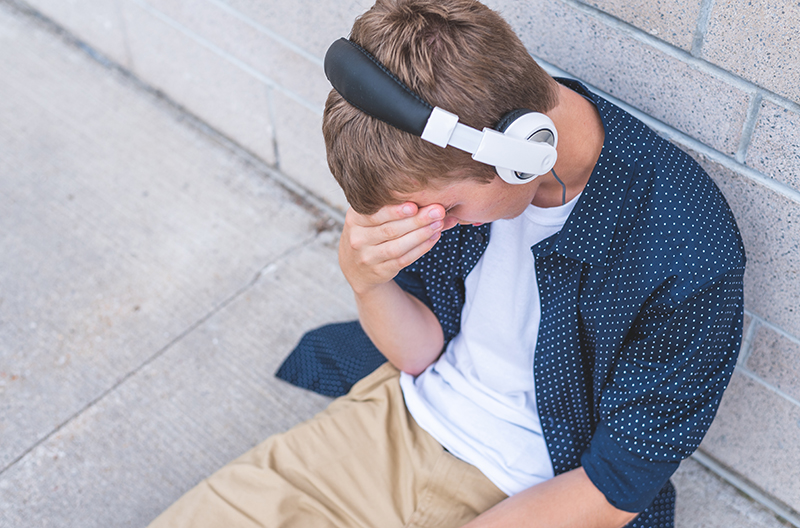Children in mental health crisis spent more than 900,000 hours in A&E in England
Children as young as three in emergency departments for mental health problems, data obtained by Labour reveals.
Children suffering mental health crises spent more than 900,000 hours in A&E in England last year seeking urgent and potentially life-saving help, NHS figures reveal.

Experts said the huge amount of time under-18s with mental health issues were spending in A&E was "simply astounding" and showed that NHS services for that vulnerable age group were inadequate.
Children as young as three and four years old are among those ending up in emergency departments because of mental health problems, according to data obtained by Labour.
Dr Rosena Allin-Khan, the shadow mental health minister, who is also an A&E doctor, said: "With nowhere to turn, children with a mental illness are left to deteriorate and reach crisis point - at which time A&E is the only place left for them to go. Emergency departments are incredibly unsuitable settings for children in crisis, yet we're witnessing increasingly younger children having to present to A&E in desperation."
Young people who endured long A&E waits included those with depression, psychosis and eating disorders as well as some who had self-harmed or tried to kill themselves, doctors said.
Allin-Khan obtained data under freedom of information laws from 81 acute hospital trusts in England - accounting for 73% of them - which showed that under-18s spent 657,953 hours in their A&Es in 2021-22 where their chief complaint was related to their mental health. The MP then used the average number of hours at those 81 trusts to estimate that children and young people across all the 111 trusts she surveyed spent a total of 901,640 hours in an emergency department - or just under 103 years.
"The number of hours young people in mental health crisis have spent in A&E - an often chaotic and stressful environment - is simply astounding," said Deirdre Kehoe, the director of training and services at the charity Young Minds. "It is inexplicable that young people are waiting so long for what is meant to be urgent care."

The figures are likely to reflect that under-18s in a mental health crisis in A&E often have to wait a long time either for an assessment or treatment by specialists and also for a bed in a child and adolescent mental health residential unit.
"These are truly shocking figures. It is deeply distressing for a child in a mental health emergency to have to wait for care for hours at a time," said Andy Bell, the interim chief executive of the Centre for Mental Health think tank.
The number of hours spent in A&E has risen in recent years at the same time as more children and young people are suffering from mental health disorders. For example, the proportion of 17 to 19 year-olds with a probable disorder jumped from 10% in 2017 to 26% last year, partly driven by the Covid-19 pandemic.
Similarly, the number of estimated total hours under-18s have spent in A&E has soared from 698,411 in 2017-18 to last year's 901,640, Allin-Khan's NHS data shows. Young people in the midst of serious mental turmoil are having to go to A&E, which is designed to treat physical rather than mental health problems, because there are so few out-of-hospital services available for them, especially early intervention support.
Bell said: "While the NHS is expanding children's mental health services, it's struggling to meet growing levels of need. And without effective early help in communities, children have to wait until they reach crisis point to get support, placing yet more pressure on emergency services and inpatient beds."
Allin-Khan said: "Children's mental health services have reached crisis point with an explosion in demand, inadequate service provision at community level and a shortage of child and adolescent mental health service beds. It is heartbreaking and totally unacceptable that, as a result of years of government neglect, community [mental health] services are failing our children."
Data supplied by University hospital Southampton NHS trust showed that a three-year-old whose chief complaint was related to mental health spent five hours and 28 minutes in its A&E in 2021-22. A year before, a four-year-old had also spent two hours and 28 minutes there.
That trust has also experienced a dramatic increase in the number of under-18s in mental health crisis ending up in A&E. In 2012-13 it treated 21 young people, who spent 92 hours between them in its emergency department. But in 2021-22 it had 230 children who spent 2,812 hours in A&E. Similarly, the longest wait in A&E experienced by any under-18 there rose from 20 hours and 12 minutes in 2012-13 to 50 hours and five minutes in 2021-22.

Allin-Khan said a Labour government would ensure that every school provided access to mental health support for pupils, set up an "open access hub" in every community and recruited 8,500 new mental health staff, paid for by closing tax loopholes.
In a report this week on NHS mental health services the National Audit Office said children and young people were among the groups who encountered the longest waits for care and treatment for mental health issues.
Kehoe said: "A&E departments are not the right place for people experiencing what can be one of the most distressing times in their life, let alone children this young. The recent NHS announcement that mental health professionals will now be based in ambulance control centres is a clear acknowledgment that people in mental health crisis need specialist support."
The Department of Health and Social Care declined to respond directly to under-18s' long stays in A&E. A spokesperson said: "We are investing an extra £2.3 billion a year into mental health services, so that an additional 2 million people can get the support they need, including an additional 345,000 children and young people.
"We are also investing £150 million into schemes that address pressures on local urgent and emergency mental health care pathways and support people to be cared for closer to home, including alternatives to A&E and hospital admission such as crisis houses, safe havens and step-down services."
The spokesperson added that there were 287 mental health support teams in about 4,700 schools and colleges across the country, which would increase to 400 by April.
Article by Denis Campbell
Posted February 10, 2023
Published by The Guardian
- enquiries@schooltv.me
- •
- +61 3 8538 1644
- •
- Ts & Cs
- •
- Privacy Policy
- •
- Get Alerts
- •
- © 2026 SchoolTV ANZ Pty Ltd

